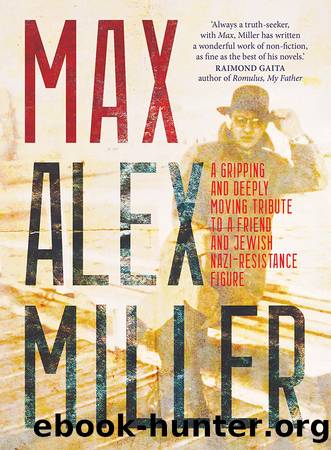Max by Alex Miller

Author:Alex Miller
Language: eng
Format: epub
Publisher: Allen & Unwin
Published: 2020-08-20T00:00:00+00:00
FRAGMENT 13
Two beautiful cows
IN THE COOL MORNING, we took the train from WrocÅaw to BolesÅawiec through the peaceful countryside of Silesia, a brief stop at Legnica on the way. Wreaths of mist lay along the grooves of the landscape, arable fields and a few head of cattle. The impression of Lower Silesia Iâd retained from Maxâs stories was of a dark wintry industrial landscape populated by hungry factory workers longing for a socialist revolution which would liberate them from poverty and the cruel oppression of their masters. The landscape we travelled through was of another order altogether. Lower Silesia was peaceful, rural countryside, a place of sunlit fields in lovely springtime, the days innocent of turmoil, the cattle so content they were half asleep and could barely rouse themselves to turn their heads and look at us as we went by. I didnât see even the ruined remains of what might have been in Maxâs time a factory from the industrial age.
I was leaving WrocÅaw with the powerful impression of a deep silence hanging over the landscape, a profound sense of absence, of something missing that I had not felt when we first arrived. An image of Olek was in my mind, walking alone along the broad empty night street of his town, a solitary figure, his kippah firmly in place, his persistence a quiet act of heroism.
~
Dorota and Jacek, old friends already, were waiting for us on the platform at BolesÅawiec. As Jacek drove us along narrow country roads and up steep hills into the Karkonosze mountain range, accompanied by Dorotaâs running commentary, I gazed out the window of the car in a kind of daze. According to the names of the towns and villages, we were in a Slavic country, yet the architecture of castles and farms and the general layout of villages was German. Silesia, or that part of it we visited with Dorota and Jacek, reminded me of Thuringia in central Germany, where we had walked in the beech forestâthe German name of which, Buchenwald, reminded me of the death camp of the same name. The language here, though, was Polish, as were the lavish displays of cakes. The Poles evidently love cake! In fact, during the whole of our time in WrocÅaw, the only person we met who spoke German was our landlordâthe returnee, as he styled himself, a German believing he could justly claim a place in WrocÅaw. And he may have been right about this. I donât know. People will believe what they wish to believe. The truth rarely has anything to do with the necessity of belief.
When I began to write up my notes after we got home, I soon found I hadnât made enough detailed observations of Silesia to write about it with conviction. I wrote to Dorota and asked for her memories of the two days weâd spent together. She replied the following day:
On Saturday we picked you up from the station in BolesÅawiec and probably went straight to the pottery shop, from where we drove to Castle Kliczków, north of BolesÅawiec.
Download
This site does not store any files on its server. We only index and link to content provided by other sites. Please contact the content providers to delete copyright contents if any and email us, we'll remove relevant links or contents immediately.
The Girls I've Been by Tess Sharpe(1289)
Firekeeper's Daughter by Angeline Boulley(1175)
21st Birthday (Women's Murder Club) by James Patterson(1141)
Harry Potter and the Sorcerer's Stone by Rowling J K(1095)
I Think I Love You by Auriane Desombre(1083)
Harry Potter 01 - Harry Potter and the Sorcerer's Stone by J.K. Rowling(1056)
Let's Talk About Hard Things by Anna Sale(984)
The Lion King by Disney Book Group(974)
Perfect Illusion by Claudia Tan(957)
Flamefall by Rosaria Munda(876)
The Montessori Baby by Simone Davies(845)
You Are Awesome by Neil Pasricha(833)
You'd Be Home Now by Kathleen Glasgow(781)
Time To Go by Time To Go (epub)(740)
A Pho Love Story by Loan Le(731)
Pax, Journey Home by Sara Pennypacker(725)
Aristotle and Dante Discover the Secrets of the Universe by Sáenz Benjamin Alire(669)
Yolk by Mary H. K. Choi(659)
Sandwiches! by Alison Deering(651)
